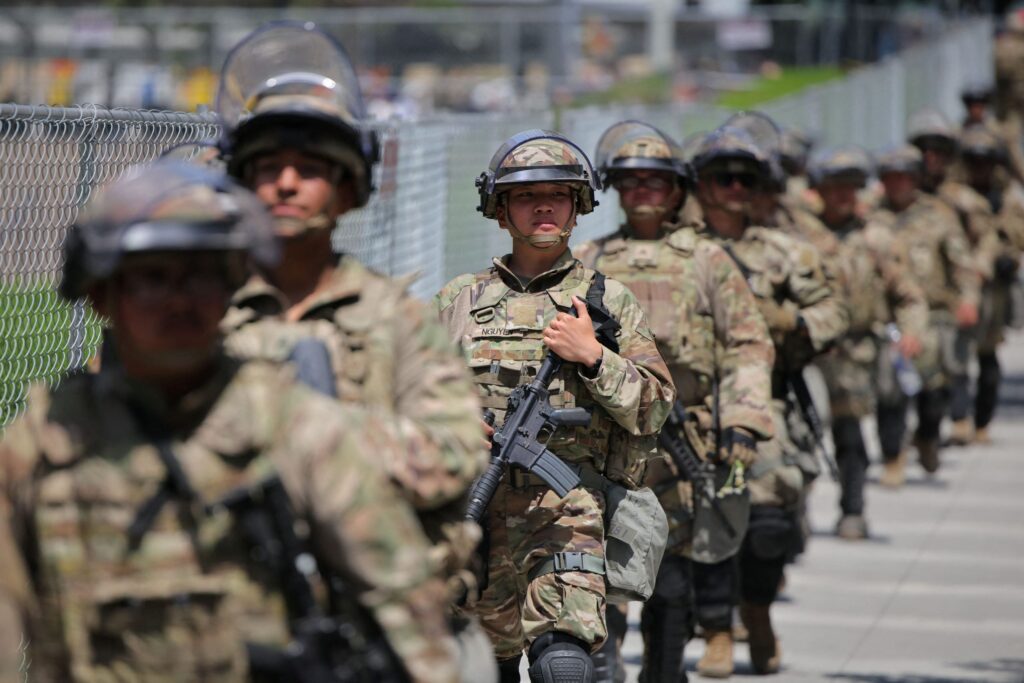(CNN) — The Trump administration has been planning for weeks to send the National Guard to Chicago, two officials told CNN, as President Donald Trump looks to expand his anti-crime agenda and crackdown on immigration in major cities across the United States.
It is not yet clear how many troops would be sent to Chicago, or when those deployments would start.
Trump seemed to preview those plans in the Oval Office on Friday, saying, “I think Chicago will be our next, and then we’ll help with New York.”
Chicago Mayor Brandon Johnson, a Democrat, said Friday that the city has not heard from the White House about the deployment or any increased law enforcement presence, adding that such a move would be “uncalled for” and “unlawful.”
“There are many things the federal government could do to help us reduce crime and violence in Chicago, but sending in the military is not one of them,” Johnson said in a statement.
Johnson told MSNBC on Sunday the city would take legal action if Trump sent troops into the city, adding that “the people of this city are accustomed to rising up against tyranny.”
“What he is proposing at this point would be the most flagrant violation of our Constitution in the 21st century. The city of Chicago does not need a military occupation,” Johnson said. “That’s not what we need. In fact, we’ve been very clear about what we need. We need to invest in people to ensure that we can build safe and affordable communities.”
When asked for comment, the White House on Saturday referred CNN to Trump’s remarks in the Oval Office a day earlier. The president said Friday he hadn’t spoken to the Chicago mayor when asked by a reporter whether he had taken any “concrete steps” toward a crackdown in the city.
A spokesperson for the Pentagon told CNN, “We won’t speculate on further operations. The Department is a planning organization and is continuously working with other agency partners on plans to protect federal assets and personnel.”
Illinois Gov. JB Pritzker said in a statement Saturday that he has not heard from the federal government and that Illinois has not made requests to the federal government for help.
“The safety of the people of Illinois is always my top priority. There is no emergency that warrants the President of the United States federalizing the Illinois National Guard, deploying the National Guard from other states, or sending active duty military within our own borders,” Pritzker said.
The plans align with the Trump administration’s unusual efforts to use the military for law enforcement and immigration actions within the US’ borders.
The administration’s potential moves in Chicago, first reported by the Washington Post, would be different from the law enforcement crackdown in Washington, DC, where Trump — and in turn the federal government — has more leeway in directing troops and a range of federal authorities.
Instead, the administration’s future plans, including in Chicago, are expected to look like Trump’s deployment of the National Guard earlier this summer to Los Angeles to quell immigration protests, sources told CNN.
In June, Trump evoked Title 10 of the US Code to send about 700 active-duty Marines and 4,000 National Guard troops to Los Angeles over the objection of California Democratic Gov. Gavin Newsom. Title 10 allows the president to deploy the National Guard as necessary to repel invasion, suppress rebellion or execute laws, which means the National Guard reports to the president rather than the governor.
California immediately challenged the legality of Trump’s deployment of the National Guard in a lawsuit that is making its way through the court system.
Still, Trump touted the move as an unmitigated success. “Without the Military, Los Angeles would be a crime scene like we haven’t seen in years,” he wrote on social media in June.
It is not uncommon for federal authorities, like the National Guard, to assist in emergency situations across the country in cases of disaster relief or civil unrest. But experts say that sending in the National Guard in a blanket order to crack down on crime and implement Trump’s immigration policies is unprecedented.
As the administration looks to expand its immigration agenda inside the US, rather than just on the southern border, it has tried to augment Immigration and Customs Enforcement’s capacity by pulling personnel from multiple agencies, including the US military.
CNN has previously reported that internal discussions have included how to mobilize active-duty troops from consenting states as force protection for federal agents and whether National Guard units from Republican-led states could be used in non-consenting states.
Attorney General Pam Bondi has also made clear that cities and states across the country with so-called sanctuary policies, which limit local officials from assisting in federal immigration enforcement, could be a target for the National Guard.
However, Democratic governors and city mayors are pushing back.
“Stop attacking our cities to hide your administration’s failures,” Boston Mayor Michelle Wu, a Democrat, said earlier this week in response to a letter from Bondi.
This story has been updated with additional information.
CNN’s Alejandra Jaramillo contributed to this report.

